10 Best Treatments for Circadian Rhythm Sleep Disorders
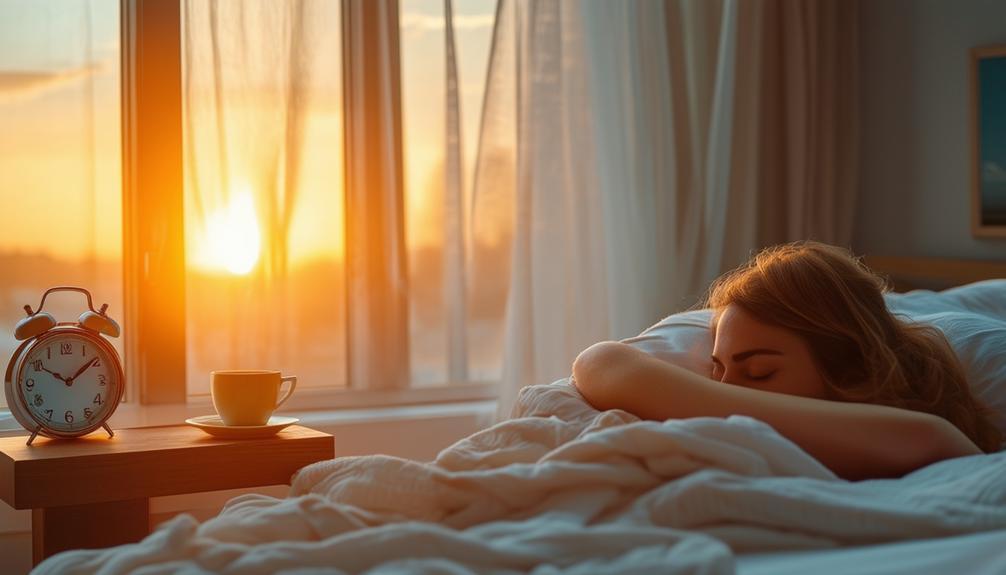
To manage circadian rhythm sleep disorders, use evidence-based treatments like bright light therapy and chronotherapy to reset your internal clock. Melatonin supplements can help regulate sleep-wake cycles. Cognitive Behavioral Therapy (CBT) targets sleep-related thoughts and behaviors. Maintain good sleep hygiene and block blue light to enhance sleep quality. Medication management, with a healthcare provider's guidance, can address more severe cases. Proper diet and nutrition, along with environmental modifications, support peak sleep patterns. Timed exercise and noise reduction techniques further optimize your sleep environment. Explore additional details to find the best approach for you.
Noteworthy Details
- Bright light therapy effectively realigns circadian rhythms by exposure to specific light wavelengths at optimal times.
- Melatonin supplements help regulate sleep-wake cycles and improve sleep onset in circadian rhythm disorders.
- Cognitive Behavioral Therapy for Insomnia (CBT-I) addresses behavioral and cognitive factors to improve sleep patterns.
- Maintaining consistent sleep hygiene practices, like a regular sleep schedule and a relaxing bedtime routine, supports circadian rhythm alignment.
- Customized chronotherapy gradually shifts sleep times to desired schedules, tailored to individual circadian rhythm needs.
Bright Light Therapy
Bright light therapy is a scientifically-proven treatment for managing circadian rhythm disorders like delayed sleep phase syndrome (DSPS). If you struggle to sleep at socially acceptable times but sleep well when following your own schedule, this therapy might be particularly beneficial for you. The treatment involves exposing yourself to bright light, which helps reset your biological clock.
The timing of light exposure plays a critical role in the effectiveness of bright light therapy. For instance, morning light exposure is pivotal for people with DSPS. By receiving bright light soon after waking up, you can gradually shift your circadian rhythms to align with conventional sleeping hours. This process mimics the natural cues your body would receive from sunlight, thereby regulating your sleep-wake cycle.
Typically, longer exposure to bright light, ranging from 30 to 90 minutes, is recommended to guarantee effectiveness. During this period, using a lightbox that emits light at an intensity of around 10,000 lux is crucial.
Following this regimen can greatly improve your ability to fall asleep and wake up at desired times, making you feel more connected and in sync with societal norms.
Chronotherapy
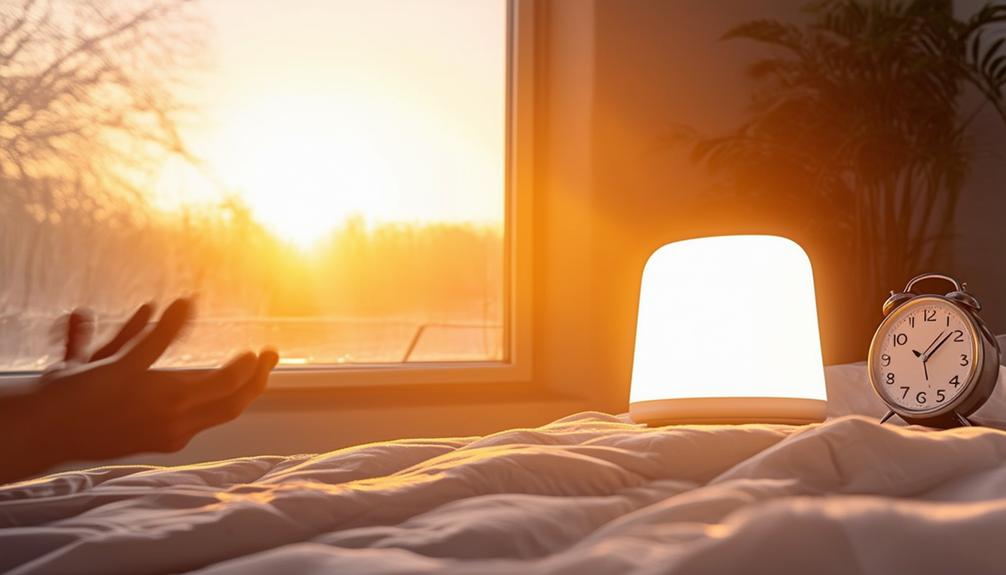
Chronotherapy involves systematically adjusting your sleep schedule to gradually align your circadian rhythm with desired sleep-wake times. This treatment approach is particularly beneficial for individuals suffering from circadian rhythm disorders like delayed sleep-wake phase disorder (DSWPD) and advanced sleep-wake phase disorder (ASWPD).
By incrementally shifting your bedtime and wake time by 1-2 hours each day, chronotherapy aims to reset your internal clock. For instance, if you have DSWPD, you might progressively delay your sleep schedule until it coincides with a more conventional timetable. Conversely, for ASWPD, you'd advance your sleep times.
A successful chronotherapy regimen requires a personalized plan developed in collaboration with healthcare providers. This plan takes into account your specific disorder, lifestyle, and daily commitments, ensuring the adjustments are sustainable and effective.
It's essential to adhere strictly to the schedule outlined in your plan, as inconsistent application can hinder progress.
Melatonin Supplements
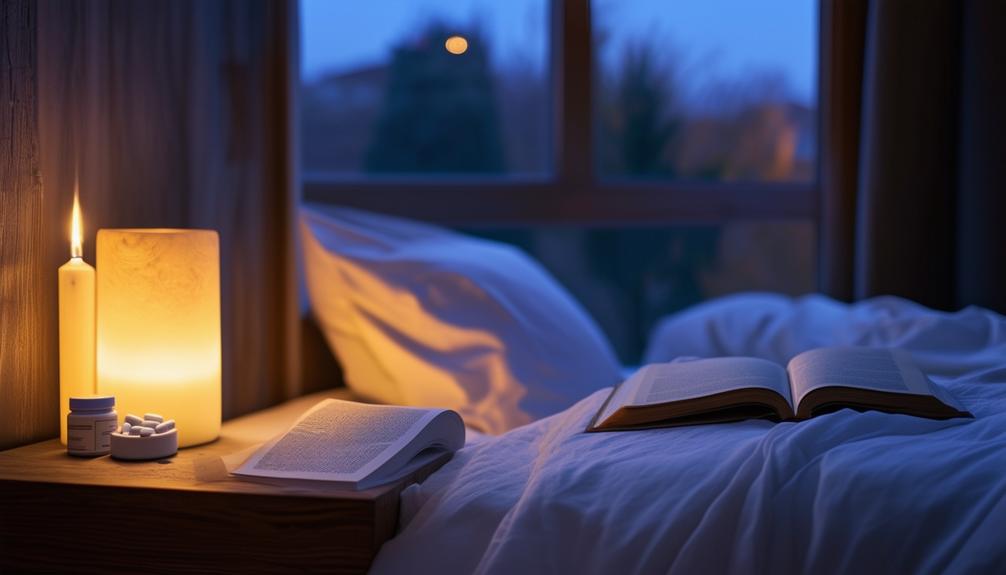
When considering melatonin supplements for circadian rhythm sleep disorders, you need to focus on proper dosage and timing to optimize benefits.
Be mindful of potential side effects, such as daytime drowsiness and dizziness, which can impact your daily activities.
Always consult your healthcare provider to guarantee safe and effective use tailored to your specific condition.
Dosage and Timing
To effectively manage circadian rhythm sleep disorders, one must take melatonin supplements at the correct dosage and timing. Melatonin supplements can help align your sleep-wake cycle, especially if taken in the proper amount and at the right time. Typically, the dosage ranges from 0.5 to 5 milligrams, and it's important to take it 30 minutes to 2 hours before bedtime. This timing is vital, as it helps regulate your internal clock.
Consulting a healthcare provider is highly recommended to determine the appropriate dosage and timing for your specific needs. They can help you navigate the complexities of melatonin receptor agonists, such as tasimelteon, which are prescribed for conditions like non-24-hour sleep-wake rhythm disorder.
Here are some key points to bear in mind:
- Take melatonin at the same time each day to regulate your circadian rhythm effectively.
- Start with a lower dosage to see how your body responds, then adjust as needed under the guidance of a healthcare provider.
- Keep a sleep diary to track your sleep patterns and adjust the timing accordingly.
- Avoid consuming caffeine or alcohol close to the time you take your melatonin supplements.
Potential Side Effects
Taking melatonin supplements can lead to potential side effects, including daytime drowsiness, dizziness, and headaches. It's important to be aware that melatonin supplements may also cause gastrointestinal issues such as nausea, diarrhea, and stomach cramps. Some users report experiencing vivid dreams, irritability, or mood changes. These side effects can impact your daily functioning and overall well-being.
Before starting melatonin supplements, you should consult your healthcare provider, especially if you have specific medical conditions or are taking other medications. Melatonin can interact with blood thinners, diabetes drugs, and other medications, potentially leading to adverse effects. Your healthcare provider can help you weigh the benefits against the risks and determine the appropriate dosage and timing for your situation.
Here's a quick overview of potential side effects:
| Side Effect | Description |
|---|---|
| Daytime Drowsiness | Feeling unusually sleepy during the day |
| Dizziness | Experiencing lightheadedness |
| Headaches | Mild to moderate head pain |
| Gastrointestinal Issues | Nausea, diarrhea, stomach cramps |
| Mood Changes | Irritability, vivid dreams |
Cognitive Behavioral Therapy
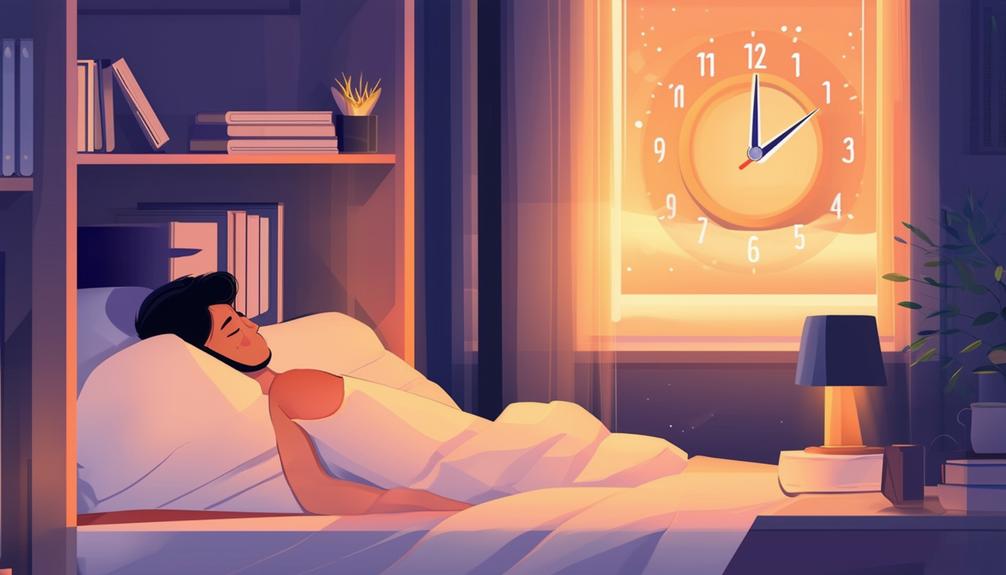
Cognitive Behavioral Therapy (CBT) is a highly structured and evidence-based intervention designed to modify the thoughts and behaviors that disrupt your sleep patterns, offering a reliable treatment option for circadian rhythm sleep disorders. By targeting the beliefs and actions that negatively impact your sleep quality, CBT helps you address the root causes of your sleep issues, such as stress and anxiety.
CBT is particularly effective for circadian rhythm sleep disorders because it tackles the maladaptive behaviors and irrational thoughts that contribute to these conditions. Through a combination of behavioral strategies and cognitive restructuring, you'll learn to manage your stress and anxiety, which can greatly improve your sleep quality.
Here's what you can expect from CBT for sleep disorders:
- Behavioral strategies: Techniques to alter sleep-related behaviors and create better habits.
- Cognitive restructuring: Identifying and challenging irrational thoughts about sleep.
- Stress management: Tools and techniques to reduce anxiety and stress.
- Sleep scheduling: Guidance on maintaining a consistent sleep-wake cycle.
Sleep Hygiene
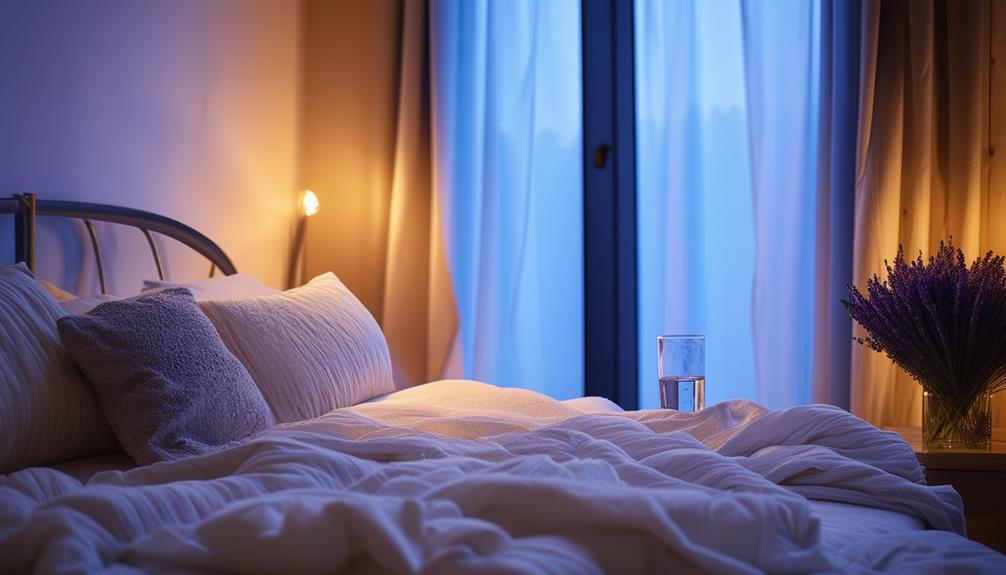
Building on the cognitive and behavioral techniques of CBT, enhancing your sleep hygiene can further stabilize your circadian rhythm and improve sleep quality. Establishing a consistent bedtime routine is essential. Aim to go to bed and wake up at the same time every day to align your circadian rhythm sleep-wake cycle.
Your sleep environment also plays a pivotal role. Make sure your bedroom is cool, dark, and quiet to promote ideal sleep conditions. Avoid caffeine, alcohol, and heavy meals close to bedtime as they can disrupt your sleep patterns. Equally important is limiting exposure to electronic devices before bed, as the blue light from screens can interfere with melatonin production.
Incorporating physical activity into your daily regimen can also aid in regulating your sleep-wake cycle. However, avoid vigorous exercise close to bedtime. Instead, focus on relaxation techniques such as deep breathing or meditation, which can help you wind down and prepare your body for sleep.
Timed Exercise

Incorporating timed exercise into your daily routine can effectively regulate your circadian rhythms and improve sleep quality. Engaging in physical activity at specific times of the day can greatly enhance the essential effects of timed exercise on your sleep-wake cycle.
Morning exercise is particularly advantageous, as it can help reset your circadian rhythms and boost daytime alertness. Consistent timing of your exercise routines is vital to support your body's natural circadian rhythm and promote overall well-being.
Regular physical activity can yield numerous benefits for your sleep patterns and circadian rhythm sleep disorders:
- Improved sleep quality: Exercise can help you fall asleep faster and enjoy deeper, more restorative sleep.
- Enhanced sleep patterns: Regular physical activity can stabilize your sleep-wake cycle, making it easier to maintain consistent sleep patterns.
- Increased daytime energy: Morning exercise can enhance your alertness and energy levels throughout the day, contributing to better overall functioning.
- Reduced circadian rhythm disruptions: Consistent exercise timing can mitigate the effects of circadian rhythm disruptions, helping you achieve a more balanced and healthy sleep schedule.
Blue Light Blocking
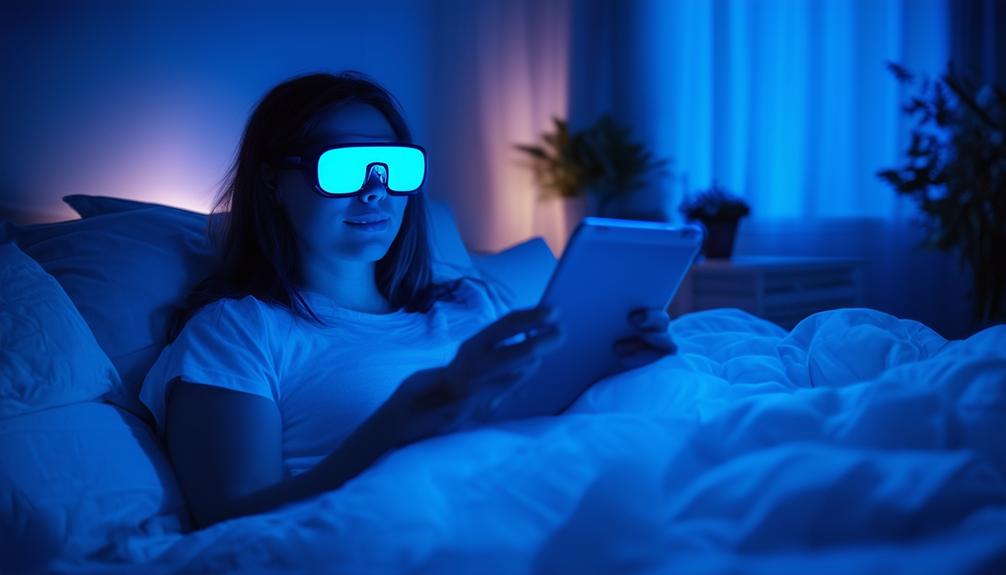
You can greatly enhance your circadian rhythm by using blue light blocking glasses and screen filters in the evening. These tools help reduce evening light exposure, promoting melatonin production and better sleep quality.
Glasses and Screen Filters
Blue light blocking glasses and screen filters are essential tools for mitigating the disruptive impact of artificial light on melatonin production, thereby aiding in the management of circadian rhythm sleep disorders.
When you use electronic devices, the blue light emitted can interfere with your sleep pattern by suppressing melatonin, the hormone responsible for regulating sleep-wake cycles.
To counteract this, incorporating blue light blocking glasses and screen filters can be highly important. These tools reduce your exposure to blue light, helping to maintain a natural circadian rhythm. Here's how they can benefit you:
- Melatonin Regulation: By filtering out blue light, these tools help sustain melatonin production, important for a healthy sleep pattern.
- Improved Sleep Quality: Reduced blue light exposure results in better sleep quality, allowing you to wake up refreshed.
- Ease of Use: Screen filters can be easily applied to your devices, and blue light blocking glasses can be worn during evening hours.
- Compatibility: These solutions work well with all types of electronic devices, from smartphones to tablets and computers.
Evening Light Exposure
Managing evening light exposure, particularly blue light from screens, is essential for maintaining natural melatonin production and promoting a healthy circadian rhythm.
Blue light, emitted by screens and electronic devices, can greatly disrupt your sleep-wake cycle by delaying melatonin secretion. This disruption can lead to difficulty falling asleep and poor sleep quality.
To mitigate the impact of blue light, consider using blue light blocking glasses or installing blue light filters on your devices. These tools can help reduce melatonin suppression and align your sleep-wake cycle more closely with natural patterns.
For best results, avoid exposure to bright screens at least two hours before bedtime. This practice signals your body to start preparing for sleep, enhancing your shift to restful sleep.
Additionally, limiting artificial light in the evening is vital. Opt for dim, warm lighting in your living space to further support melatonin production.
Regulating evening light exposure isn't just about better sleep; it's about fostering a sense of belonging in your body's natural rhythms. By making these small adjustments, you'll be taking a significant step toward improving your overall sleep patterns and maintaining a healthy circadian rhythm.
Medication Management
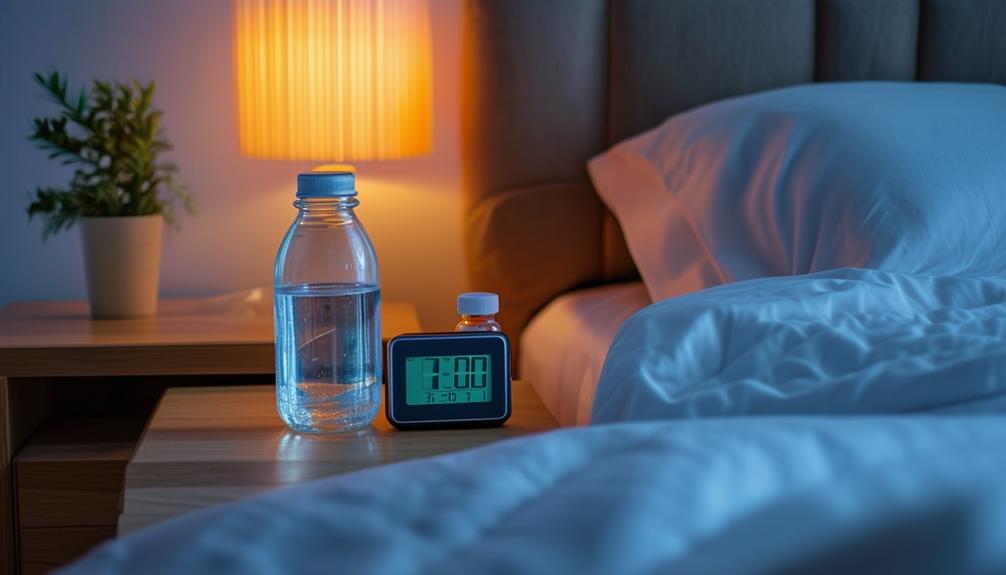
When addressing circadian rhythm sleep disorders, medication management frequently includes melatonin supplements and receptor agonists to realign the disrupted sleep-wake cycle.
Melatonin plays an important role in regulating your internal clock. However, since melatonin supplements aren't FDA-regulated, consult your healthcare provider to guarantee safe and effective use.
Melatonin receptor agonists, such as tasimelteon, are specifically useful for non-24-hour sleep-wake rhythm disorder. These medications mimic melatonin's function and help stabilize your sleep patterns.
For enhancing sleep and alertness, benzodiazepines and zolpidem are commonly prescribed. They work by promoting relaxation and inducing sleep.
To manage daytime sleepiness, modafinil and armodafinil are effective. They help maintain alertness without excessively disrupting nighttime sleep. Incorporating light therapy alongside these medications can further enhance your treatment outcomes.
Combining medication management with other treatments like light therapy can offer a holistic approach to managing circadian rhythm sleep disorders.
Always discuss your options with your healthcare provider to tailor the best plan for your needs.
Diet and Nutrition

Frequently, diet and nutrition play an essential role in regulating circadian rhythms and improving sleep quality. A balanced diet with regular meal times can greatly influence your body's internal clock.
Consuming foods rich in tryptophan, such as turkey, nuts, and seeds, aids in the production of serotonin, which is a precursor to melatonin, the hormone responsible for sleep regulation. Magnesium, found in green leafy vegetables and legumes, supports muscle relaxation and overall sleep health.
Avoid heavy meals close to bedtime, as they can disrupt your circadian rhythms. Instead, focus on lighter, nutrient-dense options in the evening. Limiting caffeine intake, particularly in the afternoon and evening, can also prevent sleep disturbances.
Maintaining hydration throughout the day is important, but reduce fluid intake in the hours leading up to bedtime to avoid nocturnal awakenings.
For some, nutritional supplements like magnesium or melatonin might be necessary to address specific deficiencies. Always consult with a healthcare provider before starting any supplementation.
Environmental Modifications
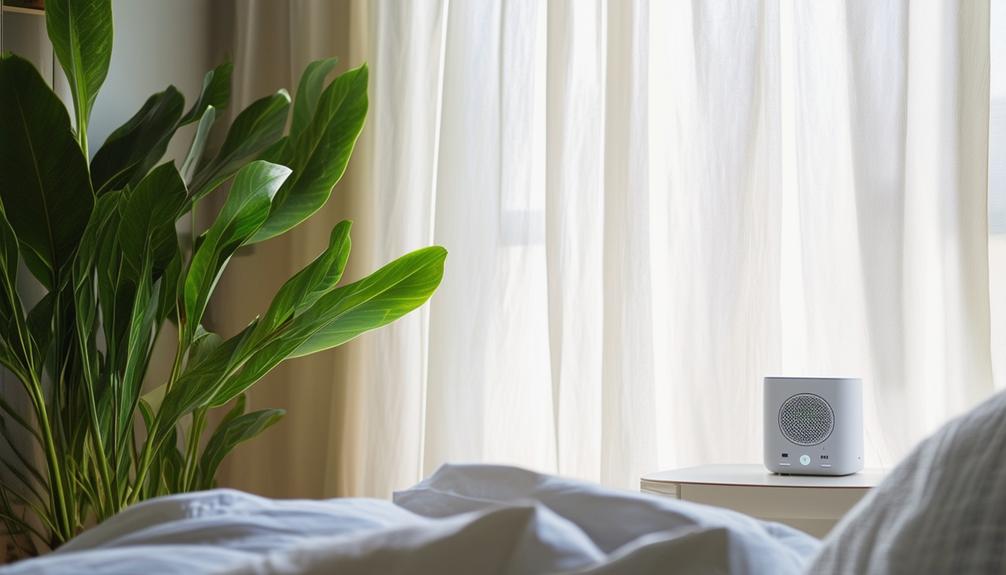
To effectively manage circadian rhythm sleep disorders, you should focus on light exposure management, optimizing your sleep environment, and employing noise reduction techniques.
Adjusting your lighting and minimizing screen time before bed can help signal your body to prepare for sleep. Additionally, creating a cool, dark, and quiet bedroom environment is essential for regulating your sleep-wake cycle.
Light Exposure Management
Effective light exposure management, a cornerstone in treating circadian rhythm sleep disorders, involves strategically timed bright light therapy to realign disrupted sleep-wake cycles. By utilizing bright light therapy, you can greatly influence your circadian rhythms, helping to manage sleep disorders.
Here's how it works:
- Light exposure: Use full spectrum lamps or natural outdoor light to simulate natural daylight.
- Timing of light exposure: The timing is essential. For example, morning light exposure can help shift your sleep schedule earlier, which is particularly useful for delayed sleep phase syndrome.
- Individualized therapy: A specialist will tailor the timing and duration of light exposure to your unique circadian rhythms, ensuring the therapy is effective for you.
- Complementary dimming: Gradually dimming lights in the evening can complement morning light exposure, helping to shift your sleep-wake cycle more effectively.
Sleep Environment Optimization
How can you transform your bedroom into a sleep-promoting sanctuary to optimize your circadian rhythm? Start by focusing on your sleep environment. Make sure your room is dark by using blackout curtains, which block external light and help regulate melatonin production. Maintaining an ideal room temperature, ideally between 60-67 degrees Fahrenheit, can greatly enhance your sleep quality.
Next, consider the impact of electronic devices. The blue light emitted from screens can disrupt your circadian rhythm, so it's important to avoid these devices at least an hour before bedtime. Instead, opt for relaxing activities such as reading a book or practicing mindfulness.
Another key factor is mattress selection. A supportive and comfortable mattress tailored to your sleep preferences can prevent discomfort and promote uninterrupted sleep. Pair this with the right pillows to ensure proper spinal alignment and further improve your sleep quality.
A clutter-free environment also contributes to a serene and relaxing atmosphere, minimizing distractions and stress. By optimizing these elements of your sleep environment, you create a sanctuary that not only fosters quality sleep but also supports the resetting of your circadian rhythm, leading to overall better health and well-being.
Noise Reduction Techniques
Reducing noise disturbances in your sleep environment through techniques like white noise machines and soundproofing can greatly improve sleep quality for those with circadian rhythm sleep disorders.
External noise interference, whether from traffic or household sounds, can be particularly disruptive. By implementing effective noise reduction techniques, you can create a more conducive sleep environment.
Consider using the following methods:
- White noise machines: These devices mask disruptive noises with soothing sounds, helping you maintain a consistent sleep pattern.
- Earplugs: A simple yet effective way to block out external noise interference, ensuring you get uninterrupted sleep.
- Soundproofing measures: Sealing windows and using sound-absorbing materials can notably reduce the impact of external noise.
- Eliminating household sounds: Addressing common disruptive noises like creaky floors or loud appliances can make a big difference.
Studies show that reducing noise disturbances can lead to better overall health outcomes and decreased daytime sleepiness. For those managing circadian rhythm sleep disorders, creating a peaceful and quiet sleeping environment is essential.
Frequently Asked Questions
What Is the Best Treatment for Circadian Rhythm Disorders?
You should explore light therapy, sleep hygiene, chronotherapy techniques, melatonin supplements, cognitive therapy, and maintaining a consistent schedule. Behavioral interventions, guided by specialists, can also be very effective in managing circadian rhythm disorders. Consult professionals for personalized advice.
What Is the Fastest Way to Reset a Circadian Rhythm?
To reset your circadian rhythm quickly, imagine your body as a finely tuned orchestra. Prioritize morning sunlight, adjust melatonin timing, maintain consistent light exposure, and follow a strict sleep schedule. Optimize sleep hygiene and avoid evening blue light.
What Drugs Fix Circadian Rhythm?
You can use melatonin supplements, light therapy, and sleep hygiene to help fix your circadian rhythm. Chronotherapy techniques, timed caffeine, social rhythm, and exercise timing are also effective. Always consult your healthcare provider to find the best approach.
What Type of Doctor Treats Circadian Rhythm Disorder?
Exploring the maze of circadian rhythm disorders? A sleep specialist is your guiding star. Consider neurologist consultations, endocrinologist referrals, and genetic testing. Behavioral therapists and sleep studies enhance a thorough approach, ensuring all-encompassing, patient-focused care.
Conclusion
To sum up, effectively managing circadian rhythm sleep disorders requires a multi-faceted approach. By embracing treatments like bright light therapy, chronotherapy, melatonin supplements, and cognitive behavioral therapy, you're not just shooting in the dark.
Incorporating sleep hygiene, blue light blocking, appropriate medications, and dietary adjustments can greatly improve your sleep patterns. Remember, it's about finding the right balance of interventions tailored to your needs, ensuring you get the restful sleep you deserve.

